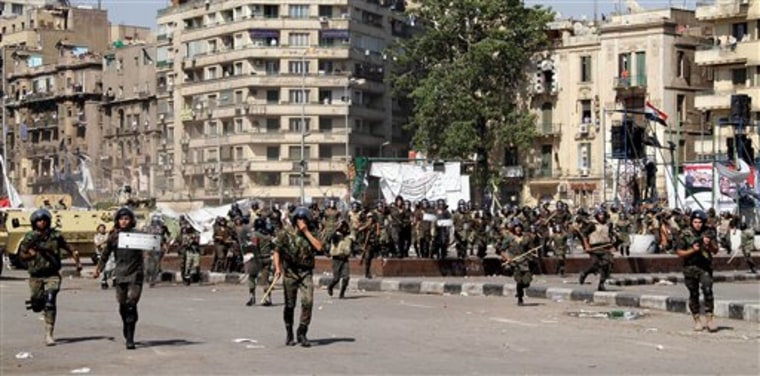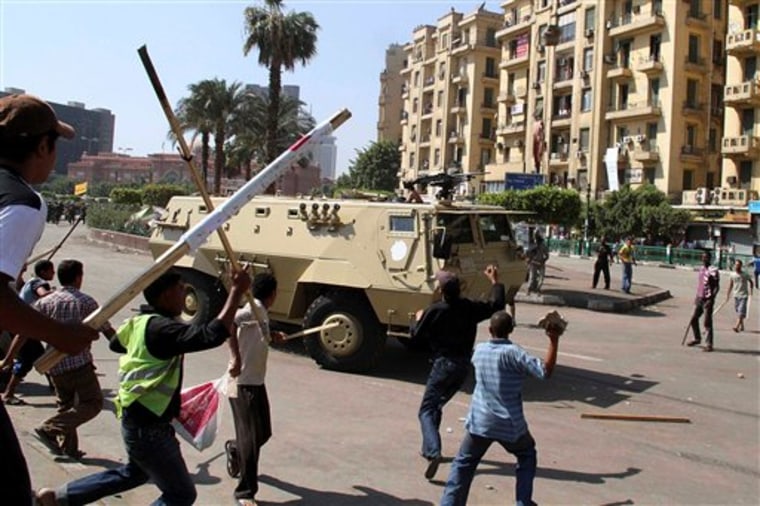Egyptian forces swinging electrified batons and shouting the battle cry "God is great" swiftly chased off dozens of activists Monday who had refused to end four weeks of renewed protests at Tahrir Square to pressure the country's transitional military rulers.
Hundreds of riot police backed by armored vehicles and soldiers moved in to tear down the camp of dozens of tents after a group of holdout activists — some of them relatives of people killed in the uprising that toppled Hosni Mubarak in February — refused pleas over loudspeakers to go home. Some in the crowd hurled stones at the police.
Firing shots in the air and using clubs, Egyptian forces cleared the square within minutes.
Mubarak's trial looming
With Mubarak's trial on charges he ordered the killing of protesters due to start Wednesday, the ruling military council appeared to run out of patience with the protesters, whose key demand is to see the former president and other members of his regime face justice.
Still, some were surprised by the security sweep, especially as it came on the first day of Ramadan, the Muslim holy month of fasting that is traditionally a time of forgiveness and tolerance.
"Attacking the families of martyrs and the people protecting them in the square seems weird. I didn't think this could happen on the first day of Ramadan," said activist Omar Kamel.
Many see the trial of the 83-year old president as a key test for the tense relationship between the protest movement and the ruling generals who took over when Mubarak was forced out on Feb. 11 after nearly 30 years in power. Many activists are skeptical that a military council headed by Mubarak's longtime defense minister can deliver on promises of democratic reforms before returning the country to civilian rule.
They also accuse it of dragging its feet with prosecutions of regime figures and say it has so far failed to weed out Mubarak loyalists from the judiciary, police and civil service.
It remains to be seen if Mubarak, hospitalized for heart problems in the Red Sea resort where he has lived since his ouster, will be brought to Cairo for his trial's opening session. Activists suspect Mubarak's lawyer and others close to him are exaggerating the extent of his health problems to delay the proceedings.
Mubarak is a former air force general, and the military council may find itself in a bind trying to bring one of its own to trial before a civilian court.
Mubarak, his security chief and six top police officers could face the death penalty if convicted of ordering the use of lethal force against the protesters. About 850 protesters were killed in 18-day uprising.
Monday's clashes in Tahrir, which was the center of the uprising, add to the tension.
"The square is the symbol of the revolution and its continuation, as many people use it to press for unmet goals," said Ammar Ali Hassan, a political analyst. "This clashes with the military rulers' views, who want the pressure to stop."

End to encampment inevitable
Breaking up the encampment, which was set up on July 8, appeared inevitable. Most of the several hundred activists who had been camping there had already decided to end the sit-in at the start of Ramadan. A small group of activists, many of them relatives of slain protesters, refused to go before Mubarak sets foot in a courtroom.
Activist Lilian Wagdy, who was in Tahrir when the forces charged in, said the clashes began when some protesters tried to stop police from entering through makeshift checkpoints.
"They beat people with sticks and electrified batons. I don't see why they had to use excessive force like this," she said.
Activist Nora Shalaby said she saw soldiers detaining at least one person and dragging him away.
"The army is everywhere now," she said.
State radio reported later that 270 people were arrested, describing them as thugs and criminals.
After the army's clearing operation, traffic immediately returned to the busy interchange for the first time in weeks, moving around a median strewn with the protesters' books, blankets, mattresses and clothes.
